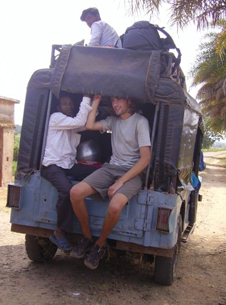Through global research, a better understanding of the world

Two Northeastern graduates have earned prestigious Fulbright U.S. Student Program scholarships to conduct research overseas this fall. Matthew Shutzer, AS’10, will study community forestry and governance in India, and Tom Jay Cinq-Mars, AS’10, will undertake a historical examination of the Russian police.
The Fulbright program, which is sponsored by the U.S. government, is an international education exchange program operating in 155 nations worldwide that aims to increase mutual understanding between Americans and the people of other countries. Shutzer and Cinq-Mars are two of more than 1,600 students who will travel abroad for the 2011-2012 academic year. Leadership potential and academic and professional achievement are key factors in Fulbright selections.
In India, Shutzer will study the relationship between agricultural communities and local forests, particularly how agriculturalists from the Kond tribe in the impoverished area Jamchuan, Orissa, manage forest resources in terms of social access and environmental sustainability. Shutzer said his research is relevant to the work done by Gram Vikas, a local NGO, following a 2006 law that formalized village administration of forestland.
“Understanding Kond agriculture and its relationship to forest use is crucial to addressing the systemic elements of poverty,” said Shutzer, who was inspired to pursue this Fulbright research and return to India following an international co-op experience there in 2008 working for Gram Vikas.
Meanwhile, Tom Jay Cinq-Mars, AS’10, is in Russia for 10 months studying the Tsarist political police and their activities in Kazan—the capital city of the Republic of Tatarstan—at the turn of the 20th Century.
Cinq-Mars’ work includes researching the relationship between the police and Russia’s burgeoning student population at a time when historians note authorities were concerned about revolutionary student groups. Kazan was the location where Vladimir Lenin – the Russian revolutionary who later founded the Soviet Communist Party – was first arrested in 1887 as a political dissident participating in a student riot.
The Fulbright marks a return to Kazan for Cinq-Mars, who previously earned a U.S. Department of State Critical Languages Scholarship for study there in the summer of 2010. This year, his research will include poring over the materials preserved at local archives and libraries and working with history and philosophy faculty at Kazan State University.
“It would be fantastic to start a lifelong collaboration,” Cinq-Mars says of working with Russian scholars.





